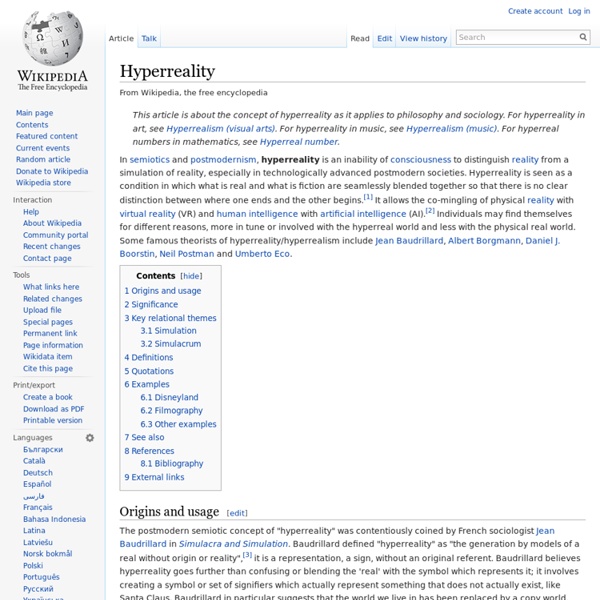Hyperreality

Corporatism
Political ideology which advocates the organization of society by corporate groups Corporatism does not refer to a political system dominated by large business interests, even though the latter are commonly referred to as "corporations" in modern American vernacular and legal parlance. Instead, the correct term for that theoretical system would be corporatocracy. Corporatism developed during the 1850s in response to the rise of classical liberalism and Marxism, and advocated cooperation between the classes instead of class conflict. Kinship corporatism [edit] Kinship-based corporatism emphasizing clan, ethnic and family identification has been a common phenomenon in Africa, Asia, and Latin America. Politics and political economy Communitarian corporatism Early concepts of corporatism evolved in Classical Greece. From the 1850s onward, progressive corporatism developed in response to classical liberalism and to Marxism. Corporatism in the Roman Catholic Church Corporate solidarism Articles
Total institution
A total institution is a place of work and residence where a great number of similarly situated people, cut off from the wider community for a considerable time, together lead an enclosed, formally administered round of life.[1]:44[2]:855[3] In Discipline and Punish, Michel Foucault discussed total institutions in the language of complete and austere institutions.[4]:231 Term origins[edit] Typology of total institutions[edit] Total institutions are divided by Goffman into five different types:[3][9] Facts[edit] According to S. Tourism and the total institution[edit] Sociologists have pointed out that tourist venues such as cruise ships are acquiring many of the characteristics of total institutions. Estimations[edit] David Rothman states that "historians have confirmed the validity of Goffman's concept of 'total institutions' which minimizes the differences in formal mission to establish a unity of design and structure Further reading[edit] Wallace, Samuel (1971). See also[edit] References[edit]
Adultism
An age restriction on operating a waffle baker independently Adultism has been defined as "the power adults have over children".[1] More narrowly, 'adultism is prejudice and accompanying systematic discrimination against young people'.[2] Etymology[edit] Coinage[edit] The word adultism was used by Patterson Du Bois in 1903,[3] and appears in French psychology literature in 1929, describing the influence of adults over children. It was seen as a condition wherein a child possessed adult-like "physique and spirit", and was exemplified by, A boy of 12 and a girl of 13 who had the spirit and personality of adults.... This definition was superseded by a late 1970s journal article proposing that adultism is the abuse of the power that adults have over children. Usage[edit] Similar terms[edit] At least one prominent organization describes discrimination against youth as ageism, which is any form of discrimination against anyone due to their age. Causes[edit] Evidence of adultism[edit] Results[edit]
Governmentality
Governmentality is a concept first developed by the French philosopher Michel Foucault in the later years of his life, roughly between 1977 and his death in 1984, particularly in his lectures at the Collège de France during this time. The concept has been elaborated further from an "Anglo-Neo Foucauldian" perspective in the social sciences, especially by authors such as Peter Miller, Nikolas Rose, and Mitchell Dean. Governmentality can be understood as: the way governments try to produce the citizen best suited to fulfill those governments' policiesthe organized practices (mentalities, rationalities, and techniques) through which subjects are governed[1] Governmentality may also be understood as: The semantics of governmentality[edit] Basic definition of governmentality[edit] The concept of "governmentality" develops a new understanding of power. "Governmentality" applies to a variety of historical periods and to different specific power regimes. "1. History of the term[edit]
Related:
Related:



